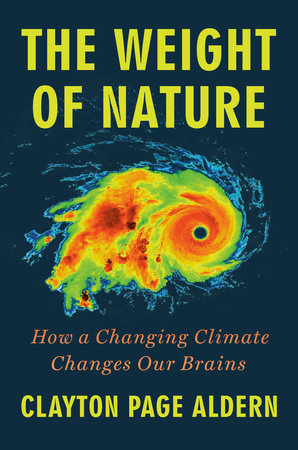使用Player FM应用程序离线!
Clayton Page Aldern: Climate Change Is Messing with Our Brains
Manage episode 439927941 series 1191071
In this episode of Writer’s Voice, we talk with Clayton Page Aldern about The Weight of Nature, his groundbreaking new book on the impacts of climate change on our brains — from PSTD to brain-eating amoebas.
Aldern explains how climate-induced stressors are shaping our mental health — harming our judgment, leading to rises in neurodegenerative diseases, and even eroding our capacity to tell truth from lies.
Clayton Aldern is a neuroscientist turned environmental journalist and senior data reporter for Grist. His climate change data visualizations have appeared in a variety of forums, including on the US Senate floor in a speech by Sen. Sheldon Whitehouse.
Writers Voice— in depth conversation with writers of all genres, on the air since 2004.
Connect with Us: Follow us on social media to stay up-to-date on the latest episodes and news. Find us on Facebook at Writers Voice with Francesca Rheannon, on Instagram @WritersVoicePodcast or find us on X/Twitter@WritersVoice.
Key words: Clayton Aldern, neuroscience, brain science, climate change, global warming, book show, podcast, brain health, PTSD, climate anxiety, Clayton Page Aldern, The Weight of Nature, neurodegeneration, environmental stressors, ALS, Alzheimer’s

Key Takeaways:
- Environmental Stress and Brain Health:
In The Weight of Nature: How a Changing Climate Changes Our Brains, Aldern explains the biological impact of environmental changes like heatwaves, air pollution, and water contamination on brain functions, leading to increased risks of neurodegenerative diseases like Alzheimer’s and ALS. These stressors affect cognitive abilities, making us more impulsive and less able to focus. - Climate Change and PTSD: Aldern discusses how climate-driven PTSD differs from other forms of trauma. Through research, he reveals how exposure to extreme climate events, such as hurricanes, increases the likelihood of disorders like ADHD, anxiety, and depression.
- The Threat Multiplier Effect: One of the pivotal moments in Aldern’s career shift was reading a Pentagon report on climate change being a “threat multiplier” for conflict. He unpacks how rapid environmental change triggers conflict by influencing our neurocognitive behavior.
- Neuroscience of Climate Anxiety: Beyond PTSD, the conversation touches on the growing issue of “climate anxiety”—a widespread emotional response to the impending environmental doom. Aldern explains the importance of balancing awareness of climate change with actionable resilience, rather than falling into paralysis.
- Resilience in the Face of Crisis: Amidst the grim realities, Aldern emphasizes creating “parables of resilience.” He discusses how communities and individuals can foster mental resilience through mindfulness practices, which can counteract some of the negative effects of environmental stress.
Memorable Quotes:
- “Climate change isn’t just a threat to our environment—it’s a threat to our brains.”
- “The environment acts as a threat multiplier, not just for conflict but for our mental health.”
- “We can adapt, but we must redefine what adaptation means in the face of this crisis.”
24集单集
Manage episode 439927941 series 1191071
In this episode of Writer’s Voice, we talk with Clayton Page Aldern about The Weight of Nature, his groundbreaking new book on the impacts of climate change on our brains — from PSTD to brain-eating amoebas.
Aldern explains how climate-induced stressors are shaping our mental health — harming our judgment, leading to rises in neurodegenerative diseases, and even eroding our capacity to tell truth from lies.
Clayton Aldern is a neuroscientist turned environmental journalist and senior data reporter for Grist. His climate change data visualizations have appeared in a variety of forums, including on the US Senate floor in a speech by Sen. Sheldon Whitehouse.
Writers Voice— in depth conversation with writers of all genres, on the air since 2004.
Connect with Us: Follow us on social media to stay up-to-date on the latest episodes and news. Find us on Facebook at Writers Voice with Francesca Rheannon, on Instagram @WritersVoicePodcast or find us on X/Twitter@WritersVoice.
Key words: Clayton Aldern, neuroscience, brain science, climate change, global warming, book show, podcast, brain health, PTSD, climate anxiety, Clayton Page Aldern, The Weight of Nature, neurodegeneration, environmental stressors, ALS, Alzheimer’s

Key Takeaways:
- Environmental Stress and Brain Health:
In The Weight of Nature: How a Changing Climate Changes Our Brains, Aldern explains the biological impact of environmental changes like heatwaves, air pollution, and water contamination on brain functions, leading to increased risks of neurodegenerative diseases like Alzheimer’s and ALS. These stressors affect cognitive abilities, making us more impulsive and less able to focus. - Climate Change and PTSD: Aldern discusses how climate-driven PTSD differs from other forms of trauma. Through research, he reveals how exposure to extreme climate events, such as hurricanes, increases the likelihood of disorders like ADHD, anxiety, and depression.
- The Threat Multiplier Effect: One of the pivotal moments in Aldern’s career shift was reading a Pentagon report on climate change being a “threat multiplier” for conflict. He unpacks how rapid environmental change triggers conflict by influencing our neurocognitive behavior.
- Neuroscience of Climate Anxiety: Beyond PTSD, the conversation touches on the growing issue of “climate anxiety”—a widespread emotional response to the impending environmental doom. Aldern explains the importance of balancing awareness of climate change with actionable resilience, rather than falling into paralysis.
- Resilience in the Face of Crisis: Amidst the grim realities, Aldern emphasizes creating “parables of resilience.” He discusses how communities and individuals can foster mental resilience through mindfulness practices, which can counteract some of the negative effects of environmental stress.
Memorable Quotes:
- “Climate change isn’t just a threat to our environment—it’s a threat to our brains.”
- “The environment acts as a threat multiplier, not just for conflict but for our mental health.”
- “We can adapt, but we must redefine what adaptation means in the face of this crisis.”
24集单集
ทุกตอน
×欢迎使用Player FM
Player FM正在网上搜索高质量的播客,以便您现在享受。它是最好的播客应用程序,适用于安卓、iPhone和网络。注册以跨设备同步订阅。




